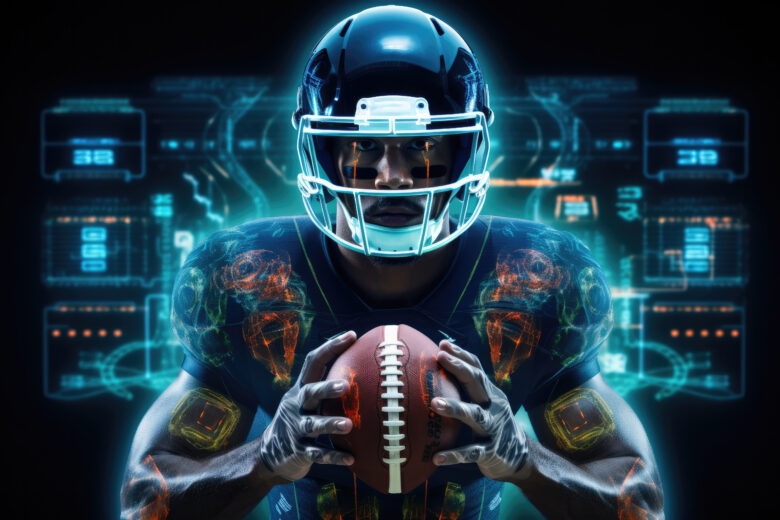Artificial Intelligence (AI) is no longer a futuristic concept; it’s a reality that is transforming many industries, including sports. From professional teams to amateur athletes, AI plays a crucial role in performance analysis, strategy, and even fan engagement. In this article, we explore how AI is revolutionizing the world of sports and why it is becoming an indispensable tool for athletes, coaches, and spectators.
1. AI in Performance Analysis
One of the most common uses of AI in sports is for performance analysis. Thanks to sophisticated algorithms, AI can process massive amounts of data to provide detailed insights and valuable information.
Biometric and Movement Analysis
Wearable sensors and smartwatches allow athletes to track their vital signs, such as heart rate, effort levels, and recovery. By combining this data with video analysis, AI software can even assess athletes’ movements (running techniques, positioning on the field, etc.) and provide personalized recommendations to improve performance and prevent injuries.
For example, in sports like football or basketball, real-time player tracking technologies can analyze speed, acceleration, direction changes, and endurance. These data are then used to adjust training plans or game strategies.
Injury Prevention
AI can also predict and prevent injuries. By studying athletes’ movement patterns and detecting anomalies, algorithms can anticipate potential injuries before they occur. For instance, an athlete performing repetitive movements incorrectly may be alerted about the risk of overuse or joint injuries. This allows for technique reassessment and adjustment of training to safeguard the athlete’s health.
2. AI and Strategic Decision-Making
Professional teams and coaches now use AI to fine-tune their strategies and maximize their chances of winning. Artificial intelligence enables real-time game data analysis to generate optimized strategies.
Analyzing Statistics and Trends
AI can analyze years of match data to extract insights about the strengths and weaknesses of opposing teams, player habits, or tactical trends. This allows coaches to make more informed decisions before and during a match. For example, football teams like FC Barcelona and Manchester City use AI software to analyze opponents’ behaviors and predict potential moves.
Real-Time Strategy Optimization
Some basketball teams use AI algorithms during matches to assess the effectiveness of various strategies depending on how the game is progressing. By analyzing live game data (such as successful shots, fouls, etc.), AI can recommend tactical adjustments in real-time, which could give teams a decisive advantage in tight matches.
3. AI and Enhancing the Fan Experience
Beyond its impact on athlete performance and team strategies, AI is also transforming the fan experience.
Real-Time Match Analysis
Artificial intelligence makes it possible to produce automatic match summaries that capture key moments in just a few minutes. By analyzing footage, AI can identify goals, assists, fouls, and other important events. Additionally, these summaries can be personalized according to fans’ preferences, further enhancing their viewing experience.
Chatbots and Virtual Assistants
Many sports clubs use AI-powered chatbots to interact with fans. These virtual assistants can instantly respond to fan questions, whether it’s about match details, schedules, or buying tickets. Some chatbots even offer interactive experiences where users can ask questions in real-time about game developments.
Augmented Reality and AI
The integration of AI with augmented reality (AR) is another advancement that is changing the fan experience. For example, mobile apps use AI to offer 3D visualizations of matches or interactive replays. Fans can visualize ball trajectories, player movements, and other important game elements, enriching their experience.
4. AI and Refereeing: A More Accurate Future
Artificial intelligence is also making waves in the world of refereeing. The VAR (Video Assistant Referee) system, used in sports like football, is a perfect example of AI’s impact on decision-making accuracy and fairness.
Video Assistance for Greater Accuracy
In football, for example, the VAR system uses cameras and AI software to analyze actions in real-time. AI helps referees make more accurate decisions on controversial situations, such as offside calls, penalties, or goals. This type of technology significantly reduces human error and ensures greater fairness during matches.
Real-Time Decisions
AI can also be used to accelerate decision-making in sports like tennis, where systems like Hawk-Eye track the ball’s trajectory to determine if it landed in or out. These systems have significantly reduced challenges to referee decisions and improved match flow.
5. AI and Esports: The New Frontier
Esports (competitive video gaming) is another area where AI is playing a major role. Esports teams use AI-driven software to fine-tune their tactics and anticipate the moves of opposing players. AI also helps to analyze player trends and optimize strategies based on the strengths of each team member.
Moreover, AI is used to create more realistic and intelligent virtual opponents, offering players and spectators an even more immersive gaming experience.
Conclusion: A Promising Future for AI in Sports
Artificial intelligence is redefining the sports world at every level. Whether it’s for analyzing athlete performance, refining team strategies, enhancing the fan experience, or improving refereeing accuracy, AI is becoming an indispensable tool. As technology continues to evolve, AI will likely play an even more central role in the future of sports, offering richer experiences and optimized performance.
Whether on the field or in front of our screens, AI is now a key ally in modern sports. The revolution is underway, and it’s not slowing down!

